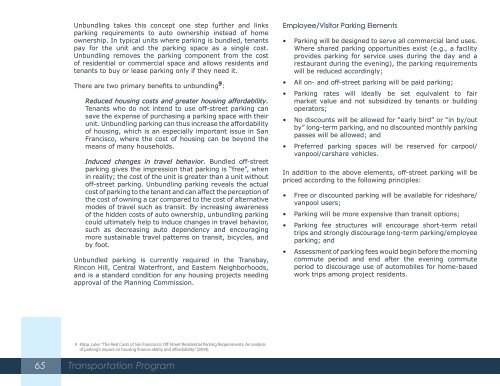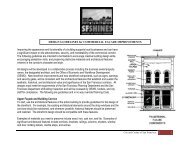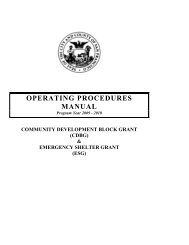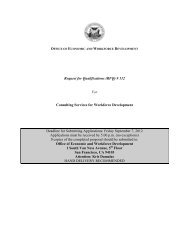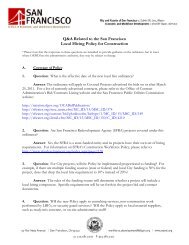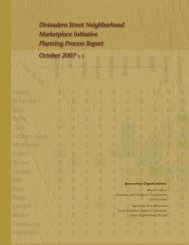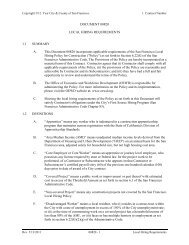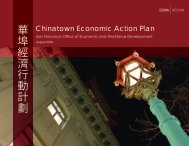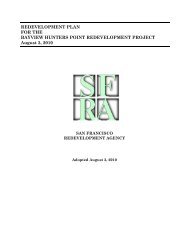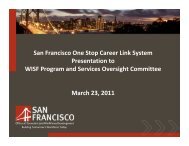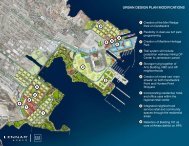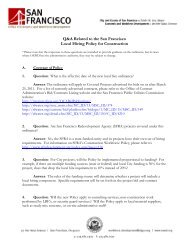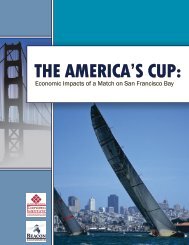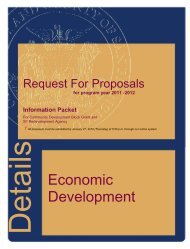& Candlestick Point Hunters Point Shipyard Phase II - Office of ...
& Candlestick Point Hunters Point Shipyard Phase II - Office of ...
& Candlestick Point Hunters Point Shipyard Phase II - Office of ...
- No tags were found...
Create successful ePaper yourself
Turn your PDF publications into a flip-book with our unique Google optimized e-Paper software.
Unbundling takes this concept one step further and linksparking requirements to auto ownership instead <strong>of</strong> homeownership. In typical units where parking is bundled, tenantspay for the unit and the parking space as a single cost.Unbundling removes the parking component from the cost<strong>of</strong> residential or commercial space and allows residents andtenants to buy or lease parking only if they need it.There are two primary benefits to unbundling 9 :Reduced housing costs and greater housing affordability.Tenants who do not intend to use <strong>of</strong>f-street parking cansave the expense <strong>of</strong> purchasing a parking space with theirunit. Unbundling parking can thus increase the affordability<strong>of</strong> housing, which is an especially important issue in SanFrancisco, where the cost <strong>of</strong> housing can be beyond themeans <strong>of</strong> many households.Induced changes in travel behavior. Bundled <strong>of</strong>f-streetparking gives the impression that parking is “free”, whenin reality; the cost <strong>of</strong> the unit is greater than a unit without<strong>of</strong>f-street parking. Unbundling parking reveals the actualcost <strong>of</strong> parking to the tenant and can affect the perception <strong>of</strong>the cost <strong>of</strong> owning a car compared to the cost <strong>of</strong> alternativemodes <strong>of</strong> travel such as transit. By increasing awareness<strong>of</strong> the hidden costs <strong>of</strong> auto ownership, unbundling parkingcould ultimately help to induce changes in travel behavior,such as decreasing auto dependency and encouragingmore sustainable travel patterns on transit, bicycles, andby foot.Unbundled parking is currently required in the Transbay,Rincon Hill, Central Waterfront, and Eastern Neighborhoods,and is a standard condition for any housing projects needingapproval <strong>of</strong> the Planning Commission.Employee/Visitor Parking Elements• Parking will be designed to serve all commercial land uses.Where shared parking opportunities exist (e.g., a facilityprovides parking for service uses during the day and arestaurant during the evening), the parking requirementswill be reduced accordingly;• All on- and <strong>of</strong>f-street parking will be paid parking;• Parking rates will ideally be set equivalent to fairmarket value and not subsidized by tenants or buildingoperators;• No discounts will be allowed for “early bird” or “in by/outby” long-term parking, and no discounted monthly parkingpasses will be allowed; and• Preferred parking spaces will be reserved for carpool/vanpool/carshare vehicles.In addition to the above elements, <strong>of</strong>f-street parking will bepriced according to the following principles:• Free or discounted parking will be available for rideshare/vanpool users;• Parking will be more expensive than transit options;• Parking fee structures will encourage short-term retailtrips and strongly discourage long-term parking/employeeparking; and• Assessment <strong>of</strong> parking fees would begin before the morningcommute period and end after the evening commuteperiod to discourage use <strong>of</strong> automobiles for home-basedwork trips among project residents.9 Klipp, Luke. “The Real Costs <strong>of</strong> San Francisco’s Off-Street Residential Parking Requirements: An analysis<strong>of</strong> parking’s impact on housing finance ability and affordability.” (2004).65Transportation Program


